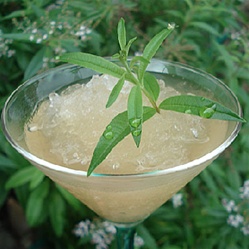We appreciate many plants at first glance on their appearance, but the first thing you notice about Lemon Verbena is its intoxicating lemony scent. Popularized in the Victorian Era as a natural perfume and aromatic home air freshener, Lemon Verbena was considered the hottest new scent among posh socialites who would use it in finger bowls, potpourris or herb sachets that they tucked into their clothes. Ancient Greeks believed that if it was placed under their pillows, it would bring sweet dreams. Symbolizing enchantment and good fortune, Lemon Verbena has a history as sweet as its smell!
Around 1250 A.D., Incan farmers discovered that by accidentally planting a variety of Lemon Verbena near their cotton crops, that it acted as a natural insect repellent. From then on, this Argentinean native herb was grown near homes to keep pests away. Brought to Europe by the Spanish, who named the plant after the Queen of Spain in 1784, Lemon Verbena was brought to North America when pilgrims migrated to “The New World”, where it still flourishes as a perennial in zones eleven through eight, and grows as a tender perennial or annual in colder areas. (It can grow to over ten feet tall in areas with very mild winters!)
A key ingredient to many cuisines including Indian, Latin American, Mexican and French, its lemony flavor is enjoyed in everything from flakey fish dishes to desserts. It is the essential ingredient in the French tea, verveine, and can be added to greased cake pans before baking to infuse the citrus taste into desserts. A delicious digestive aid and antioxidant, Lemon Verbena is a dynamic herb with a soothing lemon scent.


If the herb is native to Argentina, and if it was first brought to Europe in the 18th century, then how was it used by the Ancient Greeks?
The research we did stated that it was formally discovered in Argentina and named in 1784 by Palau, but had been in use by many cultures prior to its publication. Because the plant’s genus includes over 37 different varieties, it’s very possible that it was a variation of the Lemon Verbena we know and love today, but we found references to medicinal uses for Lemon Verbena that were used much earlier than its official discovery.